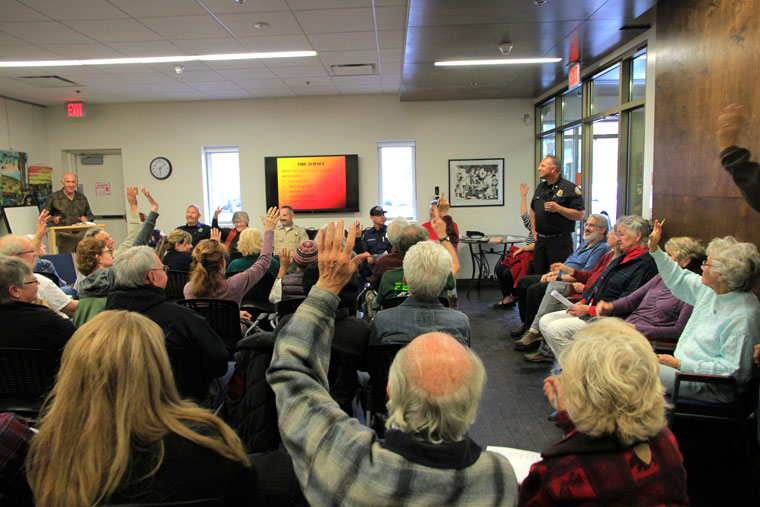
A capacity crowd turned out on Tuesday, April 25, to hear first responders and disaster-response experts discuss issues surrounding “what to know, what to expect and what to do” when disaster strikes the Hill.
Mike Feyder, Mountain Disaster Preparedness president, organized the meeting to familiarize newer residents and remind longer-term residents about evacuation dos and don’ts.
Speakers from Cal Fire, Riverside County Office of Emergency Services, Riverside County Sheriff’s Department, Idyllwild Fire Protection District, WNKI, Red Cross and MDP’s idyllwildemergency.com stressed a simple and singular message — be personally prepared and promptly leave when evacuation is ordered.
Cal Fire Battalion Chief
Jodie Gray stressed that staying behind, after being told to evacuate, takes resources away from fighting a fire. First responders must then monitor an occupied residence and do their best to protect its residents, even at the expense of carrying out their primary firefighting mission. “If you refuse to leave, you divert resources and put our lives at risk,” said Gray.
IFPD Battalion Chief Mark LaMont reminded residents that the best way to protect their homes and assist firefighters is to abate property, eliminate fire fuels and create defensible space. “We’re concerned, with increased winter precipitation, of greater fire potential than in previous years, especially because of light grassy fuels,” said LaMont. Echoing Gray, LaMont emphasized that an evacuation order is not a suggestion. “Hours of complex analyses have been poured into that decision before the order is made,” he said.
County Emergency Services Coordinator Jerry Hagen reminded attendees that the county’s Early Warning Notification System’s automated calls go only to landlines. Residents without landlines must register their cell phones. After completing and submitting the form, it will take up to 60 days for the cell phones to be in the system and part of emergency notifications. Visit http://countyofriverside.us/Residents/Emergencies/EarlyWarningNotificationSystem.aspx to register.
Hagen stressed that evacuation down dirt roads or truck trails complicates firefighting response. “Response agencies will be moving equipment on the major highways,” said Hagen. “Go where you’re told. There should be no driving down Bee Canyon. You’re driving on unburned fuel that you could ignite.”
In answer to an audience question regarding people who have no transportation, Hagen said, “The first line of defense is to develop a plan. Have your plan be ‘three deep,’ meaning three on-Hill people you can call or reach out to for assistance.”
Said LaMont, “If you can’t get out on your own, come into the [IFPD] station and put your name on our list.”
Responders stressed the importance of having a full tank of gas at all times, a 10-day supply of important medications and copies of important prescriptions. Red Cross representative Ernie Calderon said Red Cross shelter officials could get prescriptions filled within hours for shelter attendees, if they have prescription copies.
In answer to a question whether evacuation is mandatory, RCSD Lt. Chad Bianco noted residents can’t be forced to leave. But that refusal only extends to able-bodied adults. “Adults can’t make that decision for minor children or people with functional needs,” said Bianco. “Minor children and functional-needs individuals would be evacuated by officials. If you are told to go, you should go. Sometimes we care more about your life than you do.”
In answer to a question about vandalism of evacuated properties, Bianco said, “Once evacuation has been called, our department has no personnel problems. We take a proactive role in keeping your property safe.”
Calderon noted that only service dogs could be taken into Red Cross shelters, but that all attempts are made to locate temporary animal shelters next to Red Cross shelters.
The overriding message from all responders was simple and direct: leave when you are told to and only on the roads you are instructed to take. To do otherwise will threaten first responders and negatively affect the job they are charged with doing.










